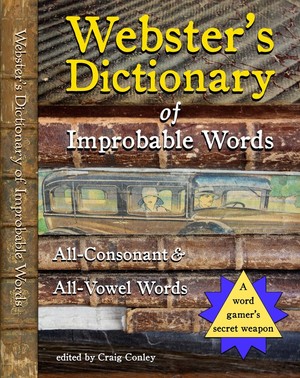 |

Is a dictionary a guidebook or a rulebook? Does it tell you where you can go or what you should do? In this fascinating compendium of improbable words comprised either entirely of consonants or entirely of vowels, Craig Conley takes guidebook lexicography (or descriptivism) to an extreme that is comic and informative in succession. "Comic" because it is at first amusing to read a dictionary with entries like "oooooo ooooo" ("a wail of wanton depravity") or "whrr" ("an emphatic spoken by a rat"). Yet it soon becomes clear that Conley is after more than jokes: like the OED, his Dictionary of Improbable Words generously quotes published instances of usage, which leads the book to read like a tribute to literary creativity in domains from video games and comics to classical and experimental fiction to straightforward ornithology—any type of writing whose authors were not satisfied with the words in the standard dictionaries and had to devise their own representations of how the world sounds ("trrt-trrt," "mm," "brrrm," etc.). As such, Conley's dictionary may be used as a rulebook for writers in search of elegant and inventive onomatopoeia for purposes ranging from the whimsical to the scientific. Conley also, by the way, reveals that the world contains more rivers, streams, and towns with all-vowel names than you might expect, and in that way his intriguing lexicon approaches the status of a literal guidebook!
The new Webster's Dictionary of Improbable Words collects hundreds and hundreds of all-vowel and all-consonant words from literature. It's a word gamer's secret weapon. Pioneering lexicographer Noah Webster (October 16, 1758 – May 28, 1843) published his first Compendious Dictionary of the English Language in 1806. He spent decade after decade expanding his dictionary to make it more comprehensive. Webster's Dictionary of Improbable Words is a testament to the great wordsmith’s dedication.
|



